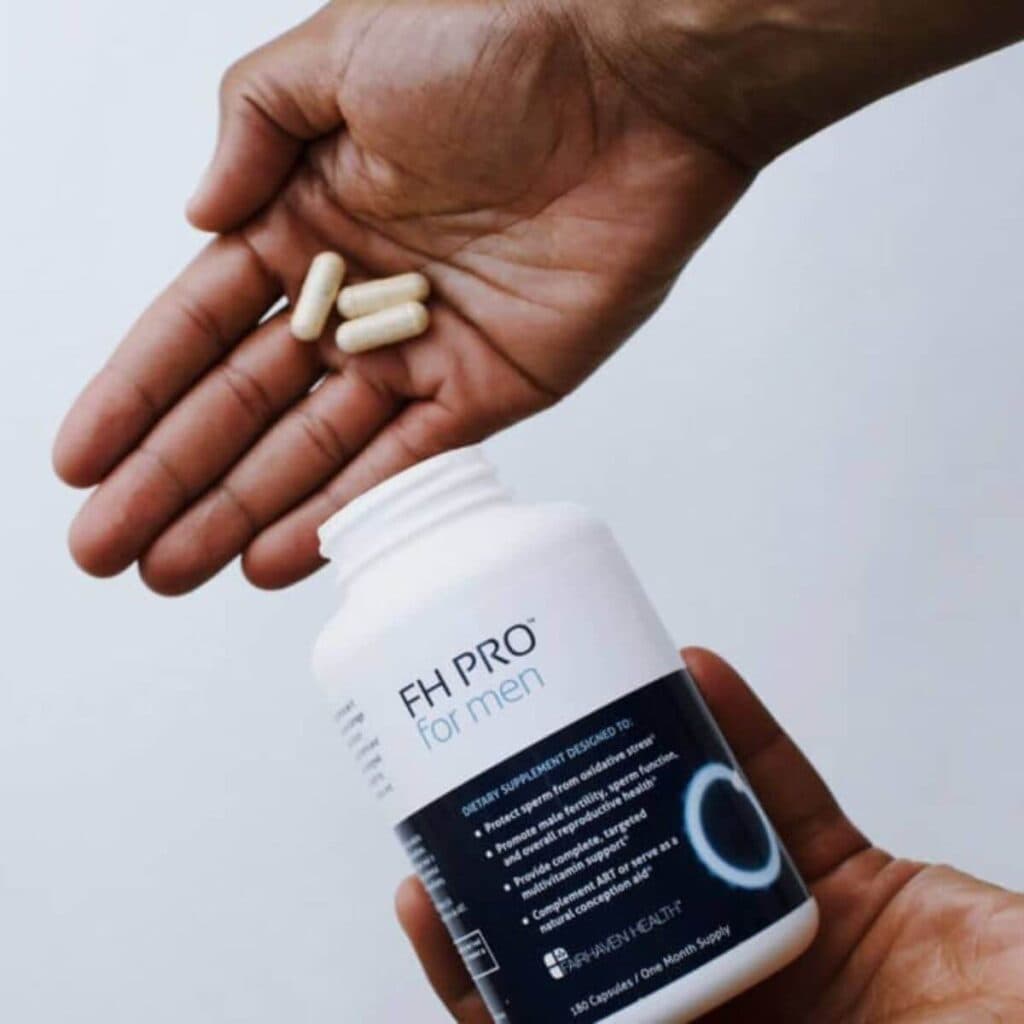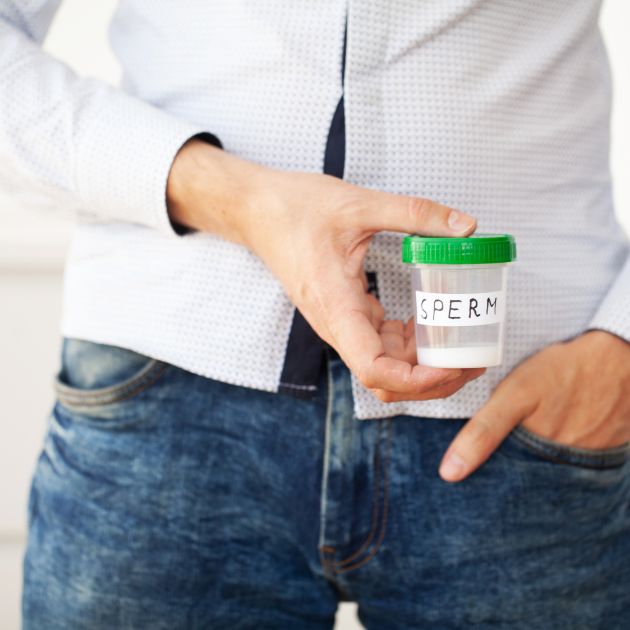Sperm health plays a crucial role in a couple’s ability to conceive, and there are things we can do to improve it. So if you’re wondering how to make sperm stronger for pregnancy, you’re in the right place, friend.
But first and foremost, I want to be clear about one thing: trying to conceive isn’t as easy as we often expect, and there are many reasons it might not go as planned. No one is at fault for this, and it’s not fair to blame either partner for the struggles we face.
So please, as you go into this article, leave any feelings of guilt, shame, or judgment at the door. Because this is a place for supportive information.
The good news is that, while struggling to conceive can be heartbreaking, there are active steps we can take to improve our fertility health and support ourselves emotionally in the process. So let’s get started.
- Understanding Male Fertility and Sperm Health
- Dietary Changes to Make Sperm Stronger for Pregnancy
- Supplements to Boost Sperm Health
- Lifestyle Factors That Affect Sperm Health
- Age and Male Fertility
- Controlling Environmental Factors to Make Sperm Stronger for Pregnancy
- Healthy Sperm is Crucial for Conception
Male Fertility Matters Just As Much As Female Fertility
Did you know that, according to research out of the journal Reproductive Biology & Endocrinology, men “are found to be solely responsible for 20-30%” of couples who struggle to conceive? And the American Society for Reproductive Medicine (ASRM) reports that fertility struggles “affect men and women equally.”
And while we’re not even a little on board with the use of words like “solely responsible”–because no one is to blame here, remember–we are on board for doing everything we can to influence better fertility health for everyone involved in the conception process.
There are so many different factors at play when it comes to fertility, and a lot of them are out of our control. But there are things we can do to influence our fertility, such as being mindful of endocrine-disrupting chemicals (EDCs), ensuring we’re consuming vitamins and nutrients proven to support fertility health, and minding certain lifestyle habits. Don’t worry–we’ll give you all the details!
We want to empower families to understand how to influence the parts of their fertility they can control.
So without further ado, let’s learn what steps we can take to actively make sperm stronger and improve your chances of pregnancy.
A huge thanks to Fairhaven Health for sponsoring this article, allowing us to take extra time and care to do a deep dive into factors that influence male fertility. Prioritizing science and high-quality ingredients, Fairhaven Health provides people with the products and information they need to naturally optimize their reproductive health and fertility.

This site contains affiliate links, meaning that we earn a small commission for purchases made through our site. We only recommend products we personally use, love, or have thoroughly vetted.
Understanding Male Fertility and Sperm Health
Sperm production and quality are crucial factors in male fertility, but they’re something that often gets overlooked as couples attempting to conceive search for answers. The good news is, while there are many things about our biology (and yes, that includes sperm) that we have no control over, there are many things we can do to influence better sperm health through adjustments to our lifestyles, behaviors, and environments.
Factors that can influence sperm health include:
- Diet: Some foods are known to improve sperm health, such as leafy greens, nuts, and fruits, while it’s often recommended to avoid processed foods, sugar, and unhealthy fats.
- Vitamin consumption: Whether getting vitamins through diet or supplements, some vitamins have been shown to have a strong impact on sperm health. For instance, antioxidants can help reduce DNA damage in sperm.
- Age: As men age, they become more likely to experience DNA fragmentation within their sperm, which can make it more difficult to conceive or carry a healthy pregnancy.
- Exposures to toxins and chemicals: Certain foods, household products, pollution, and pesticides expose us to endocrine-disrupting chemicals, which can have myriad effects on fertility health.
- Other environmental factors: In addition to exposures to certain toxins and chemicals, factors such as heat and radiation exposure can impact sperm motility and viability.
In the coming sections, we’ll dive deeper into each of these factors to give you actionable steps you can take for a positive influence on sperm health.
Dietary Changes to Make Sperm Stronger for Pregnancy
Taking steps to improve your sperm health can increase your chances of conceiving, and of a pregnancy being healthily carried to term. We always hear about the importance of diet, and it can feel really tricky when you’re trying to conceive. You don’t want to do anything “wrong,” and yet, major dietary changes can be stressful, and stress can also have a negative hormonal impact.
That’s why we’ve sifted through all the most recent research to tell you what really matters, versus what random people on Google think makes a difference.
Now, let’s focus on reasonable and sustainable changes we can make to improve semen quality and sperm health, but without stressing ourselves out or feeling like we need to overhaul our entire lives.
Sound good? Let’s take a look at what the research says, so we can decide what actionable steps are worth our while, and which ones might not support us best at this moment.
And please remember that these choices are individual–what works for one person might not be the right fit for another, and that’s okay.
A Healthy Diet for Stronger Sperm
A healthy diet is essential for overall health, and it can also improve sperm health. But what does that even mean?
First, let’s talk about nutrients. Zinc, folate, and antioxidants are all considered to be important nutrients that can improve sperm quality, though more recent studies have suggested that zinc and folic acid supplementation may not be as supportive to male fertility health as we once thought.
So while evidence doesn’t suggest we need to run out and buy Zinc supplements, it does demonstrate that certain dietary changes– as well as many other nutrients–can have a big impact.
A 2022 study decided it was time to dig deeper than just “maintain a healthy diet.” It looked specifically at the molecular impact of single nutrients on sperm quality and then zoomed out from those results to give larger-scale dietary recommendations. Their conclusions?
“While a Western diet is considered a risk factor” for men experiencing fertility struggles, “the Mediterranean diet seems to protect against” fertility issues.
Here’s what that means.
Foods to Consume Less Frequently For Improved Sperm Health
The most detailed study to date on nutrition and sperm health suggests that was it calls a “Western Diet” is a contributing factor to decreased sperm health.
Basically, there appears to be a connection between men who experience fertility issues and a diet high in the following:
- Industrially-processed foods
- Heavy intake of animal protein (i.e. meat)
- Simple carbohydrates (e.g. white bread, pasta, processed snacks)
- Trans and saturated fats (think fried food, cookies & cakes, refrigerated doughs like biscuits, and non-dairy coffee creamer)
Foods to Eat More Of To Make Sperm Stronger
Just like we clearly want to avoid overeating foods that are less optimal, there are foods research suggests that can specifically support better sperm quality.
The ideal diet, according to the one detailed research study on the subject, is what’s often called the “Mediterranean Diet,” as it has research-supported benefits for improved semen quality.
Here’s what to eat more of:
- Legumes (beans, lentils, peas)
- Cereals (especially with nuts and whole grains and less added sugar; this doesn’t mean Lucky Charms)
- Fruits (berries, citrus fruits, and melons are all rich in antioxidants, which can reduce oxidative stress and improve sperm quality)
- Vegetables (leafy greens like spinach and kale are rich in folate and other essential nutrients)
- Nuts (some small studies have suggested that nuts can benefit sperm count, vitality, morphology, and motility)
- Moderate consumption of fish
Quick Takeaway for Dietary Changes
So what does this all mean in terms of how we should eat without stressing ourselves?
The short version is that it’s important to
- Take a balanced approach to food, incorporating whole foods like fruits, vegetables, and whole grains wherever possible.
- Enjoy healthy fats, like eggs, nuts, and avocados, while reducing intake of unhealthy fats from heavily processed foods and desserts.
- Make meat part of your diet, but not the center diet.
- Eat fruits and vegetables, enjoy whole grains, and skip dessert more often than not.
Supplements to Boost Sperm Health
Improving your diet is an amazing way to ensure you’re getting the vitamins and nutrients you need, but let’s be honest–dietary changes are hard, and you’ll probably set yourself up for failure if you try to undergo a major dietary overhaul all at once.
That’s why we suggest focusing on small steps and small changes, but we understand that you’re looking for big results. This is where supplementation can be a game changer.
By consuming supplements that have demonstrated benefits for sperm quality, you can get much-needed vitamins and nutrients into your body while you make slow and steady improvements to your dietary habits.
Supplements for Sperm Health
When my husband and I were experiencing recurrent pregnancy loss, we were ready to try every trick in the book.
We started shopping at farmer’s markets to get locally sourced fruits and vegetables; we stopped eating basically all heavily processed foods; and he walked into our bathroom one day to find FH Pro for Men politely awaiting him on his counter, positioned directly in front of his sink just so it was very clear that I wanted him to take it.
FH PRO for Men is an herb-free antioxidant-based fertility supplement that provides a comprehensive approach to fertility support.* It offers comprehensive antioxidant, vitamin, and mineral support, with over 25 ingredients, to support male fertility and sperm health.

FH PRO for Men was shown in a clinical study to support sperm count, motility, and morphology.* Additionally, significant results in DNA Fragmentation and Oxidation Reduction Potential were observed following supplementation.^*
Such supplements are a popular option for improving sperm health, as they can help provide nutrients that may be lacking in the diet.
Some of the most effective supplements for sperm health include:
- CoQ10: Coenzyme Q10, or CoQ10, is an antioxidant that can improve sperm count, motility, and morphology. It can also reduce oxidative stress in the body, which can harm sperm health.
- L-carnitine: L-carnitine is an amino acid that can improve sperm motility and reduce DNA damage. It works by helping sperm cells produce energy.
- Vitamin D: Vitamin D is essential for overall health, and while further studies are needed, evidence suggests it may also improve sperm quality. Research has shown that low levels of vitamin D are associated with reduced sperm count and motility.
Ultimately, the research suggests that supplements for sperm health (as long as you’re taking the right ones), can improve sperm quality, but it’s important to talk to a healthcare provider before starting any new supplements, as they can interact with other medications and have side effects.
*These statements have not been evaluated by the Food and Drug Administration. This product is not intended to diagnose, treat, cure or prevent any disease.
^*For more information on the clinical study, please visit www.fh-pro.com.
Lifestyle Factors That Affect Sperm Health
In addition to supplements, there are several lifestyle factors that can impact sperm health. The good news is that these are fairly easy to implement slowly so that you don’t get too overwhelmed!
Here are some of the most important factors to consider:
- Exercise: Regular moderate exercise can improve overall health and reduce stress, both of which can improve sperm health. A sedentary lifestyle and excess exercise have both shown potentially damaging effects on sperm health.
- Stress: Some data suggests that acute stress might impair testicular function, and chronic stress is associated with lower testosterone levels and decreased sperm production. Find ways to reduce stress where possible, such as practicing yoga or meditation. (We know, we know, this is easier said than done, so while we want you to build in time for yourself to help reduce stress, please try not to stress over your stress levels!)
- Smoking: Smoking has been linked to reduced semen volume and sperm count. If you smoke, consider quitting or cutting back.
Actionable Steps to Improve Sperm Quality Through Lifestyle Changes
Improving sperm health is not always easy, but making positive changes can help. Here are some tips to help you get started:
- Make small changes: Trying to overhaul your entire lifestyle at once can be overwhelming and can actually increase stress. Instead, focus on making small changes that you can stick with over time.
- Exercise: If you don’t already exercise, add in 20 minutes a day, 5 days a week of moderate exercise. You could take a walk and combine it with meditation, and you’ll check off the stress reduction box and the exercise box all in one!
- Be patient: Improving sperm health takes time, so be patient and stick with it. Over time, these changes can help you improve your chances of conception.
Age and Male Fertility
So you’re trying to conceive and want to make sure your sperm is in tip-top shape?
Age is one of the biggest factors to consider, as sperm quality and quantity can decline as men get older. But don’t worry, there are plenty of things you can do to help keep your swimmers strong.
Avoid Exposure to Toxins and Chemicals
The last thing you want is for your sperm to be exposed to toxins and chemicals. Pesticides, lead, and other environmental toxins can all harm sperm health. To reduce your exposure, choose organic foods whenever possible and be mindful of chemicals in the workplace.
Reduce Alcohol Consumption
We all like to let loose from time to time, and I’m not immune to that either! In fact, we live in an alcohol-saturated culture where pretty much every adult function includes alcohol in some form.
But did you know that too much alcohol can have a negative impact on sperm health? It can reduce sperm count, motility, and morphology. When you’re trying to conceive, it’s best to limit alcohol consumption or avoid it altogether.
Avoid Hot Tubs and Saunas
While we all love a relaxing soak in a hot tub or sauna, it’s important to know that exposure to heat can harm sperm health.
Sperm is stored in the testes (outside of the body), which naturally keeps sperm temperature low. Exposing sperm to outside heat factors can be problematic because sperm requires lower temperatures in order to mature properly.
If you’re wondering if infrequent use of a hot tub or sauna is making it difficult to conceive, the answer is probably no, but frequent exposure can reduce sperm count and motility.
If you’re trying to conceive, it’s best to avoid hot tubs and saunas as much as possible, as well as other kinds of heat (tight underwear, for example) in order to prevent oxidative stress and DNA damage in sperm.
Maintain a Healthy Weight
While it’s not super fun for anyone to talk about weight, the truth of the matter is that body weight does affect sperm. Specifically, obesity has been linked to reduced sperm count and motility.
But the opposite is true, too: low body weight can also adversely affect your sperm. According to a study that analyzed the association between BMI and semen quality in 3966 sperm donors, being “underweight was significantly associated with lower sperm concentration, total sperm number and total motile sperm count.”
Ultimately, your weight does affect the number and motility of your sperm. Focus on nutrition, exercise, and getting yourself into a position to give your sperm the greatest chance possible of finding the egg.
Manage Stress
We know it’s not easy to manage stress, and we’re not blaming anyone for feeling stressed. But high levels of stress can harm sperm health and reduce fertility.
If you don’t have a regular stress maintenance practice, there are some concrete ways to help manage stress, like relaxation techniques such as meditation or yoga. Exercise can also be helpful for reducing stress.
The good news is that there are plenty of things you can do to help keep your sperm healthy and strong.
By avoiding exposure to toxins and chemicals, reducing alcohol consumption, avoiding hot tubs and saunas, as well as tight underwear, maintaining a healthy weight, and managing stress, you can give yourself the best chance of conceiving.
Remember, talk to YOUR healthcare provider for personalized advice on improving sperm health.

Controlling Environmental Factors to Make Sperm Stronger for Pregnancy
When it comes to making healthy sperm, our lifestyle choices aren’t the only factors at play. Environmental factors also have a significant impact on sperm health.
Exposure to endocrine-disrupting chemicals (EDCs) and other toxins can be harmful to sperm health, and these pesky chemicals can be found in everything from our food to our cleaning products.
But don’t worry, there are things you can do to reduce your exposure and improve your sperm health!
First, start by being mindful of the products you use in your home. Choose organic foods whenever possible, and avoid the use of chemical pesticides and household products. You can find lists of clean foods and products at Safer Choice (a website published by the US Environmental Protection Agency).
These simple changes can make a big difference in reducing your exposure to harmful toxins and improving sperm health.
Radiation exposure is another environmental factor that can impact sperm health. While the evidence is still unclear, it’s best to err on the side of caution and limit radiation exposure as much as possible. So put down that laptop and pick up a book, or consider using a hands-free device for your phone to reduce exposure.
Healthy Sperm is Crucial for Conception
We hope you’ve learned just how crucial healthy sperm is for fertility and conception. The good news is that you can take action to improve your sperm health by being mindful of your environment and making positive changes to your lifestyle.
Talk to a healthcare provider for personalized advice on improving sperm quality, and consider making lifestyle changes like eating a healthy diet, engaging in regular exercise, reducing alcohol consumption, maintaining a healthy weight, and managing stress. You got this!










